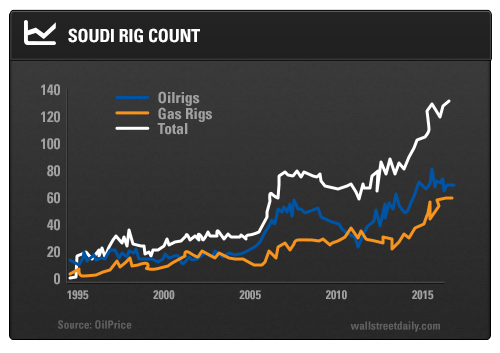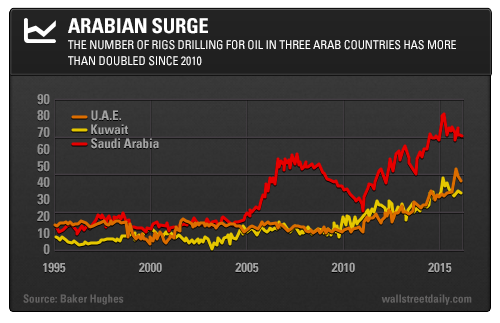Last week, my article on the Saudi Arabian oil and solar outlook, Saudi Arabia’s Solar Planning Is Paved in Oil Production, certainly shook up a hornet’s nest in the Twittersphere.
In the piece, I postulated that the Saudis – under the de facto leadership of 30-year-old Mohammed bin Salman (MbS) – would move toward dramatically increasing their oil production over the coming years in order to move towards taking over the solar power market.
As espoused in public statements, Saudi Arabia intends to be as much a powerhouse in solar energy as it has been in oil.
MbS is a strategist. He realizes that by mid-century, oil will be worth a lot less – perhaps even zero, as the book The Energy World Is Flat postulates.
This theory, however, is not an entirely popular one.
Here are a few of the “nicer” tweets as a result of my original article:
@wallstreetdaily Author of the article thinks that his Highness the Crown Prince has read this book and be part of the vision inspired by the book.
@wallstreetdaily That’s just a guess from the author of that book ridiculous I don’t think we’re gullible idiocy to believe his heresy.
My Response
It’s true, I am not a member of the Saudi royal family and not privy to the thoughts of MbS. And I doubt that Mohammed bin Salman has actually read the book.
But MbS is the most western-savvy Saudi leader to govern an Arab nation. Notice that, during his recent visit to the U.S., he spent more time in discussion with Wall Street and Silicon Valley than to the talking heads in Washington, D.C.
Not to mention he has opened the Saudi stock market up to foreigners and intends to sell 5% of the Saudi crown jewel, Saudi Aramco, in an IPO.
He’s likely well aware of the threat the Saudis face in that a good portion of those 260 billion barrels of proven reserves could turn into stranded assets left in the ground.
The Threat Is Real
There’s no shortage of evidence that Saudi Arabian energy efforts are soon to evolve.
MbS is on high alert, especially since warnings that “peak oil demand” could occur somewhere around 2025 are coming not only from the former oil minister, but also Mohammed al-Sabban, a senior adviser to the Minister of Petroleum of Saudi Arabia.
As Jim Krane, a fellow at Rice University’s Baker Institute where he studies Saudi energy policy, told The Wall Street Journal: “If the Saudis want to avoid being stuck with most of their reserves stranded underground, the signs now say they better sell it off sooner rather than later.”
Further, a recent paper that appeared in Nature stated that Middle Eastern nations could, ultimately, have around 38% of their reserves stranded underground as a result of climate change as well as the expected global changeover to solar power by mid-century.
Oil giant BP (LON:BP) also estimated that, at the current rate of production, Saudi reserves would last another 64 years.
Not surprising, then, is that the Crown Prince recently promised that the country could increase production by a million barrels immediately and raise the target to possible output of 20 million barrels daily. His words were: “We will sell at any opportunity we get.”
Talk, though, is cheap – including the recent chatter from the Saudis that the oil market glut was disappearing and the market rebalancing.
Despite all of this additional supporting evidence, the main reason I believe the Saudis want to get rid of as much oil as they can, while they can, is simple: I’m watching what the Saudis have actually been doing since the 1980s.
Just the Facts, Ma’am
They’ve been busy!
Saudi Aramco CEO Amin Nasser added his voice to that of MbS when he said, “Production will increase upward.” No kidding.
The rise this year is likely coming from the finish of the expansion project at the Shaybah field, which is increasing Saudi production capacity by 250,000 barrels.

In addition, the Saudis are expanding the Khurais field. This will add another 300,000 barrels a day in production by the end of next year.
This is just the tip of the iceberg. Since 2014, the number of oil rigs has jumped from 58 to 67. And the number has nearly doubled since 2010. Last year’s number of rigs was at least a 20-year high for the Saudis.
This means the Saudis are working hard to expand those current fields and develop new ones. Unlike other oil producers, the Saudis have yet to cancel one project.

And when you hear the Saudis talk about a “slight” increase in production, keep in mind that, on a global scale, that’ll be much larger. An increase of a mere 5% in 2015 came to 500,000 barrels a day, enough to meet all demand growth in the developed world.
I’m sure many will continue to disagree with this forecast, but it looks to me as if MbS and the Saudis are moving on to phase two of their oil plan. That is, to produce more – shifting the risk of stranded assets to higher-cost producers in places like the U.S.
Or, as Jim Krane puts it: “Move their crude to market before the world moves on [from oil].”
Good investing.
